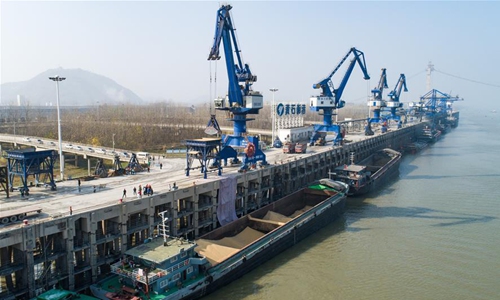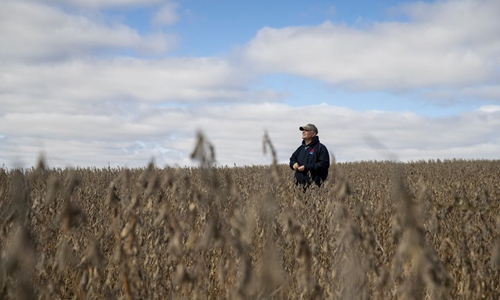Elections, US economy affecting Trump: expert

Aerial photo shows imported soybean in bulk being transferred from a ship to containers in Huangshi New Port of central China's Hubei Province on Dec. 27, 2019. China Railway Wuhan Group Co., Ltd. started a regular cereal freight train for railway and waterway multimodal transportation from Huangshi of Hubei Province, to Chengdu of Sichuan Province. The new service will shorten the freight transportation time between Huangshi and Chengdu by seven days at least as compared with previous sole waterway transport. (Xinhua/Xiao Yijiu)
Is the new year a fresh start for China-US trade relations?
It seems like so. US President Donald Trump just sent a New Year gift, announcing in a tweet on Tuesday that he will sign a phase one deal with China on January 15 and later go to Beijing to negotiate phase two.
Chinese analysts and former officials told the Global Times that there has been limited suspense about the signing of the phase one deal, being it sooner or later, whether in China, US or a third country. But negotiations on phase two may not begin very soon, as China's willingness to sit down all over again will depend partly on how phase one works out.
"Early January may be a good time because both sides want the deal in earnest," Wei Jianguo, a former vice commerce minister, told the Global Times. Wei noted that although the content of the deal was agreed on December 13, there was still much work to do including a review of the text translation.
Trump tweeted the signing ceremony would take place at the White House with high-level representatives of China. But he did not identify which Chinese officials.
Gao Lingyun, an expert at the Chinese Academy of Social Sciences in Beijing who is close to the trade talks, told the Global Times on Wednesday that currently, China and the US trade negotiation teams hold regular consultations based on "diplomatic protocols" and in a way both sides had their own bottom line.
"As long as the agreement is legally binding, does it really matter if it is signed in China or the US, or signed by the leaders of the world's two largest economies?" Gao said. "There's no big difference in fact as long as both sides bury the hatchet and get back on a normal track."
The more urgent task is to hurry up the procedures so that the 21-month-long trade war could formally enter a truce period, according to Guo.
Trump's proposed trip to China for negotiations on a broader deal equated, diplomatically speaking, with Chinese officials going to Washington for a signing ceremony. "This is a careful wording," Guo said.
So far Beijing has not disclosed any details on the signing ceremonies. The Ministry of Commerce did not respond to an interview request by the Global Times as of press time during the holiday break.
Some Chinese analysts speculated that the silence indicated that Beijing was still preparing for any last-minute change, in case the US breached the spirit of the contract.
Chinese officials said on December 13 that Beijing and Washington had agreed the text of a phase one agreement in which the US committed to roll back tariffs in phases as Beijing increased purchases of US products, based on its market demand.

Farm owner Bill Pellett is seen among soybean crops in a field of his family farm in Atlantic, a small city in the Midwestern state of Iowa, the United States, Oct. 16, 2019. (Xinhua/Wang Ying)
White House advisor Peter Navarro said Monday (US time) that the agreement included terms concerning intellectual property and alleged "currency manipulation," Reuters reported.
A source with knowledge of the deal who insisted on anonymity told the Global Times the text was sketched out in a "very flexible manner," without being too clear on specific numbers.
"China does not yield on principle," the source said, "but reading between the lines, China needs to watch how the deal is being carried out and adjust accordingly."
Phase two
Chinese observers interpreted Trump's tweet as a goodwill gesture to mend souring relations with China and score political points ahead of US presidential election in 2020.
"The US economy's downward pressure has also unnerved Trump," Gao said. "He desires to begin phase two trade talks with China to de-escalate a drawn-out trade conflict with China."
But it was unlikely China would agree to move forward as Trump expected, the analysts said. "The philosophy of Chinese trade negotiators works like this: We would like to judge whether to begin the phase two deal talks based on the implementation results of the phase on deal," Gao said.
"Meanwhile the US side prefers to implement the phase one deal and negotiate the phase two at the same time."
Bai Ming, a trade expert close to the Ministry of Commerce, told the Global Times that talks on phase two would center on more difficult topics such as industrial subsidies and high-tech policies, the known sticking points during previous dozens of rounds of talks.
"Phase two talks still rely on the sincerity of the US. They will be quite hard if the US insists on containing China," Gao said.
Newspaper headline: New year, fresh start for China-US relations?